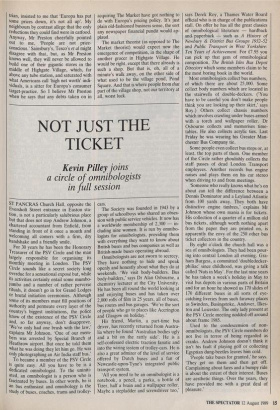NOT JUST THE TICKET
Kevin Pilley joins
a circle of omnibologists in full session
ST PANCRAS Church Hall, opposite the Eversholt Street entrance in Euston sta- tion, is not a particularly salubrious place but that does not stop Andrew Johnson, a chartered accountant from Enfield, from standing in front of it once a month and welcoming all corners with a firm, dry handshake and a friendly smile. For 30 years he has been the Honorary Treasurer of the PSV Circle and the man largely responsible for organising its monthly meeting in London. The PSV Circle sounds like a secret society long overdue for a sensational expose but, while its activities certainly entail some mumbo- Jumbo and a number of rather perverse rituals, it doesn't go in for Grand Lodges or brutal initiation ceremonies. Although some of its members must fill positions of authority and permeate every layer of the country's biggest institutions, the police know of the existence of the PSV Circle and, so far anyway, don't disapprove. `We've only had one brush with the law,' explains Mr Johnson. 'One of our mem- bers was arrested by Special Branch at Heathrow airport. But once he told them what he was doing they let him go. He was only photographing an Air India staff bus.'
To became a member of the PSV Circle is quite easy. All you have to be is a dedicated omnibologist. To the uniniti- ated, an omnibologist is a person who is fascinated by buses. In other words, he is an bus enthusiast and omnibology is the study of buses, coaches, trams and trolley- cars.
The Society was founded in 1943 by a group of schoolboys who shared an obses- sion with public service vehicles. It now has a worldwide membership of 2,300 — in- cluding nine women. It is run by omnibo- logists for omnibologists, providing them with everything they want to know about British buses and bus companies as well as British-made buses operating abroad.
Omnibologists are not sworn to secrecy. They have nothing to hide and speak openly and honestly about what they do at weekends. 'We visit body-builders. Bus body-builders,' says Dr Alan Osbourne, a chemistry lecturer at the City University. He has been all round the world looking at and enjoying buses and has taken over 2,000 rolls of film in 25 years, all of buses, bus routes and bus garages. 'We're the sort of people who go to places like Accrington and Glasgow on holiday.'
His friend, Martin, a part-time bus driver, has recently returned from Austra- lia where he found 'Australian bodies ugly and a bit on the rattly side'. He is a self-confessed electric traction fanatic and into the wiring system of trolley-cars. He is also a great admirer of the level of service offered by Dutch buses and a fan of Newcastle-upon-Tyne's integrated public transport system.
`All you need to be an omnibologist is a notebook, a pencil, a parka, a bottle of Tizer, half a brain and a wallpaper roller. Maybe a stepladder and screwdriver too,' says Derek Roy, a Thames Water Board official who is in charge of the publications stall. On offer he has all the great classics of omnibological literature — hardback and paperback — such as A History of Newbury & District Bus Groups 1932-52 and Public Transport in West Yorkshire: Ten Years of Achievement. For £7.95 you can pick up that gem of omnibological composition, The British Isles Bus Depot Directory which some members claim to be the most boring book in the world.
Most omnibologists collect bus numbers, of which there are about 25,000. Some collect body numbers which are located in the stairwells of double-deckers. ('You have to be careful you don't make people think you are looking up their skirt,' says Roy.) Others collect chassis numbers which involves crawling under buses armed with a torch and wallpaper roller. Dr Osbourne collects and memorises time- tables. He also collects acrylic ties. Last Friday he was wearing his Greater Man- chester Bus Company tie.
Some people even collect bus stops or, at least, the top parts of them. One member of the Circle rather ghoulishly collects the staff passes of dead London Transport employees. Another records bus engine noises and plays them on his car stereo when driving to and from meetings.
`Someone who really knows what he's on about can tell the difference between a Dennis Dominator and a Leyland Atlantic from 100 yards away. They both have distinctive engine timbres,' explains Mr Johnson whose own mania is for tickets.
His collection of a quarter of a million old bus tickets, although worth nothing apart from the paper they are printed on, is apparently the envy of the 250 other bus ticket collectors in the country.
By eight o'clock the church hall was a sea of omnibologists. They had been pour- ing into central London all evening. Gra- ham Burgess, a committed `cloubledecker- philiac' since childhood, was giving a talk called 'Nuts in May'. For the last nine years he has taken a week's holiday in May to visit bus depots in various parts of Britain and for an hour he showed us 170 slides of 170 different buses in all sorts of eye- catching liveries from such faraway places as Swindon, Basingstoke, Andover, Ilkes- ton and Leicester. The only lady present at the PSV Circle meeting nodded off around about frame 1985.
Used to the condescension of non- omnibologists, the PSV Circle members do not live in terror of being regarded as cranks. Andrew Johnson doesn't think it isn't his fault if playing golf or collecting Egyptian dung-beetles leaves him cold.
`People take buses for granted,' he says. `They get on them and then get off.
Complaining about fares and a bumpy ride is about the extent of their interest. Buses are aesthetic things. Over the years, they have provided me with a great deal of pleasure.'










































 Previous page
Previous page